Korean press views on N. Korea’s 4th nuclear test
Many Korean-language newspapers and other forms of mass communications media in the Republic of Korea (ROK) regretted that the ROK had neglected in properly dealing with North Korea with the result that the North had continued to develop the dangerous nuclear weapons.
North Korea announced on Jan. 6, 2016 that it had successfully carried out its test explosion of a hydrogen bomb. It was the fourth test explosion of nuclear bombs that the N. Korean regime has carried out so far.
On this development, the ROK, the United States and the rest of the Free World urged China to do something to stop N. Korea’s “dangerously playing with fire” as they believed that China had a great measure of influence on N. Korea.
China obviously knows it, and appears to be much annoyed at the latest development as the nuclear bomb testing took place obviously without an adequate advance notice even to China who the North Korean regime considered to be its best ally in the world.
Many of the S. Korean media deplored the lack of timely action to prevent N. Korea from developing the dangerous nuclear weapons.
Here are excerpts from the recent Korean-language media analyses of the situation (Unofficial English translation done by The Korea Post):
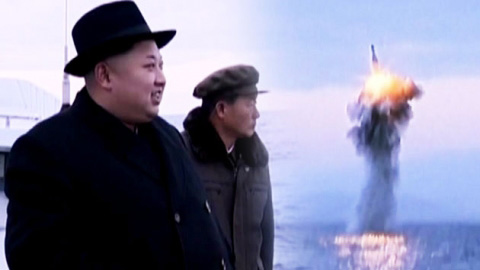
Dong-A Ilbo, independent Korean-language daily, Jan. 9, 2016:
The world is watching President Xi Jinping of China following N. Korea’s explosion of a hydrogen bomb. This is because many people believe that cooperation with China is essential in controlling N. Korea from attempting a dangerous adventure.
Secretary of State John Kerrey of the United States reportedly called Foreign Minister Wang Yi of China and told him that China’s formula to control N. Korean nuclear weapons development had failed and urged him to think up a new measure that would work.
Minister of Foreign Affairs Yun Byun-se of the ROK succeeded in contacting Wang after two days of futile endeavor, and asked China to join the international community to discourage the N. Korean regime from developing nuclear bombs.
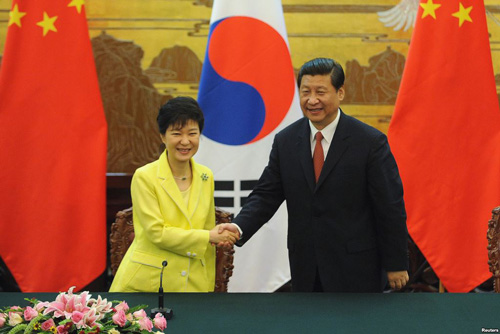
N. Korea literally cannot live without the help of China, especially the supply of crude oil, food and money from China. Reports say that the US has asked China to cut off her financial pipeline to N. Korea as in the case of the Secondary Boycott formula that the US used on Iran, which worked.
Reports indicate that China told the US to have composure and that China does not have a key to the N. Korean problem.
China has been taking a lukewarm attitude to problems related with N. Korea and there is no gainsaying that China’s turning a blind eye to North’s playing with fire ultimately caused N. Korea to carry out the fourth nuclear bomb test.
Since China became the hosting country of the Six-Party Talks, N. Korea has gained time to develop nuclear weapons, including the recently reported hydrogen bomb. Even at this juncture, China continues to insist on the use of the Six-Party Talks to deal with the N. Korean problems. China can hardly win the support of the international community on this note.
We are aware that China is internally criticizing itself since N. Korea’s third nuclear bomb testing that China is responsible for the North’s successful development and possession of nuclear weapons.
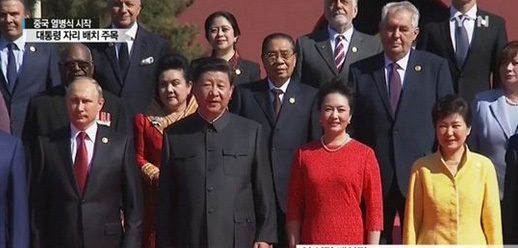
The deputy director of a Shanghai national defense strategy institute was recently quoted by the Chinese language edition of the Wall Street Journalas saying that it did not make sense for a world’s biggest country to let a small neighboring country develop nuclear weapons.
Following President Xi’s visit to S. Korea in 2014, there have been assertions that the notion of N. Korea as being a buffer zone between the US and China is an outdated presumption and that it is wrong. Instead, there are growing views that N. Korea is a burden to China and that therefore it should be abandoned.
President Park Geun-hye has made much effort to improve diplomatic relations with China even at the risk of hurting the close ties of relations and cooperation with the United States and Japan. President Park did so believing that China had a good measure of influence on N. Korea.
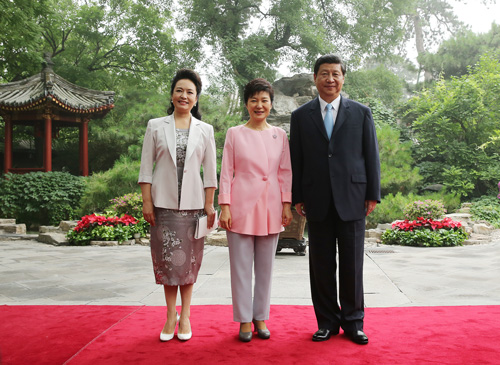
When President Park attended the celebration of China’s Victory Day in Beijing last year, she did so from her belief in the existence of such influence of China on N. Korea, including China’s support in solving the problem of the N. Korean nuclear weapons.
If China does not try to exert her influence on N. Korea’s President Kim Jong-Un to give up its nuclear weapons, S. Korea has no other choice but to seek self-defense measures, including the deployment of Terminal High Altitude Area Defense System (THAADS).
President Park Gun-hye should make a phone call in person to President Xi Jinping of China and urge him to take a resolute action on N. Korea. President Park should clearly tell President Xi that Kim Jong-Un’s playing with fire will pose an obstacle to China’s prosperity and the stability of the Northeast Asian region, and ask him how long he was going to protect Kim Jong-Un. President Xi should realize that China’s action on N. Korea will decide on the future relations between the Republic of Korea and China.
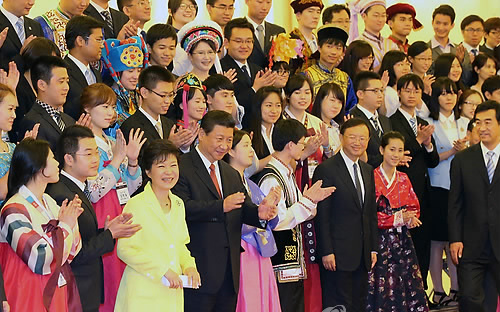
It would be childish to rely only on China to solve N. Korean nuke problems
SegyeIlbo, independent Korean-language daily, Jan. 8, 2016:
The Global Times of China(Hwanku Ilbo in Korean) has recently published a report to the following effect: “The cause of the problem of the North Korean nuclear weapons is very much complicated. One of the causes is N. Korean regime’s selection of a wrong choice for its national defense. There also is an external reason, the hostile polices of the United States against N. Korea.”
What The Global Times meant was that the program of the N. Korean nuclear weapons was born out of the hostile relations between N. Korea and the three other countries, namely S. Korea, the US and Japan.
The Global Times said: “China will not turn the Chinese-N. Korean relations into that of hostility. The Chinese society will never condone with the Chinese government for doing so.”
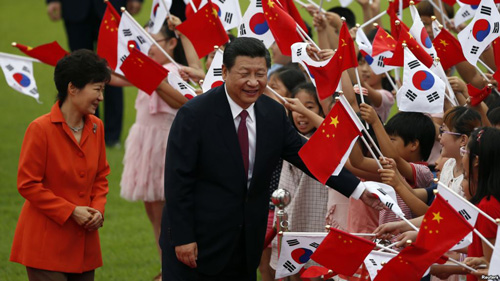
On China’s imposition of restrictions on N. Korea, the Chinese newspaper said: “China is participating in the United Nations’ sanctions against N. Korea and is adhering to the resolution of the United Nations Security Council. Due to this, the Chinese-N. Korean relations now are very much different from those of the past. On whether or not China will additionally carry out its sanction against N. Korea, China has to see the result of discussions at the United Nations Security Council.”
Park’s China diplomacy undergoes severe test: “China, supplier of oil and food to NK, should now use whips”
Editorial Writer Kang Chun-suk of Chosen Ilbo, conservative daily, Jan. 8, 2016:
The moment I heard the news of North Korea’s conducting its fourth nuclear test, I formed a mental picture of the Yalu River that meandered around the outskirts of the Dandung City of China in early November last year.
The Dandung Citywas bright as day in the middle of night with neon signs and other brilliant lights. In contrast, the Sinuiju City of N. Korea on the south of the River was in complete darkness. A N. Korea-China watcher, who has been covering the N. Korean-Chinese relations for the past 30 years, said that China used to supply up to one million tons of oil to N. Korea at one time in the past but that now the quantity has been reduced to 500,000 tons a year since the mid-1990s. He said that it accounted for more than 50% of the total oil consumption of N. Korea. Since N. Korea’s conducting of its third nuclear bomb test in 2013, China has reduced the oil supply in a control measure against her development of nuclear weapons.
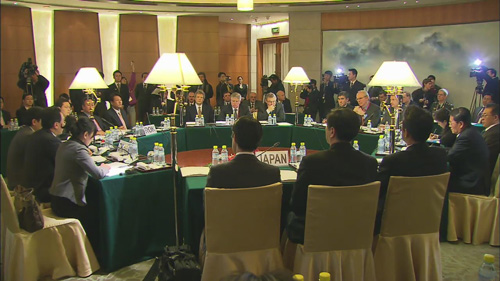
Since N. Korea announced that it had carried out a hydrogen bomb test, the people in S. Korea have been suffering from lethargy. At the National Security Council meeting in Seoul, President Park Geun-hye said, “The N. Korean nuclear test poses a threat to the security of the Northeast Asian region as well as to S. Korea, and I will try to make N. Korea pay for it.”
However, not many people in the South are taking her statement at face value because they know that there are limits to what President Park can do against the N. Korean nukes.
When N. Korea carried out the nuclear tests in 2006, 2009 and 2013, the successive Presidents of the ROK assured the people, “I will teach the N. Korean leader a lesson.” No such action has been taken by the South against the N. Korean leaders even when the situation further deteriorated.
In his New Year Address, North Korean President Kim Jong-Un did not mention even a word about the nuclear weapons. Kim only emphasized the importance of improving the economy and livelihood of the people of N. Korea. Kim’s method of deceiving the South has become cleverer.
The people in the South felt just powerless. The people in the South have now become suspicious about the existence of truth in the promises and ability of their leaders, allies, neighbors and international organizations when they said, “We will teach N. Korea a lesson and make it give up the nukes.”
The US has been leading restrictions against the N. Korean nuclear weapons development all along through the United Nations. When the US lowered the degree of control against the N. Korean nuclear weapons in order to win the cooperation of China and Russia, the ‘medical efficacy’ drastically fell almost to nil. When the US tried to increase the level of control against the N. Korean nuclear weapons development to an effective level, it was met with resistance from China and Russia. In this situation, the US has neglected to properly attend to the N. Korean nuke issue for the past 10 years--taking an attitude known as ‘benign neglect’ or ‘strategic patience.’
Since 1992 when the problem of N. Korean nuclear weapons development started, the US punished N. Korea with a blockade and isolation whenever the North broke its promise or walked out of the negotiation room.
During the Cold War Era, the US succeeded in winning the Cold War by using these tactics to the then Soviet Union. This prescription that worked on the world’s second most powerful country, the USSR, did not work on N. Koreawhowas the poorest and the most isolated country in the world.
What was the reason? What supported N. Korea against this backdrop was the oil and food supplied N. Korea by China.
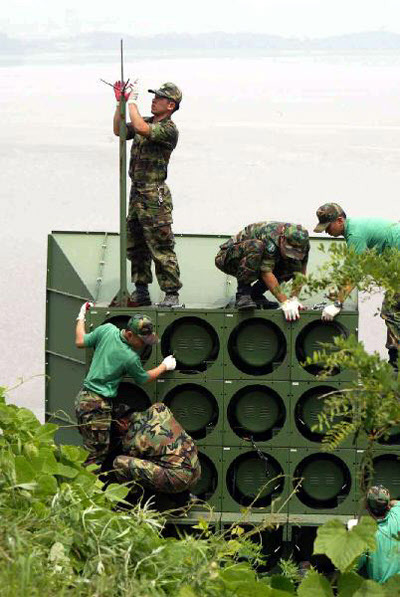
China does not want to physically confront with the US and this has been so in the past as well as at the present time.
China jumped into the Korean War (1950-3), and personally experienced the might of the US and has also experienced the existence of unsurmountable wall for the past 60-plus years on the issue of Taiwan.
For the sake of China in this state, N. Korea has been performing the role of a buffer zone keeping China out of the influence of the US. N. Korea has its worth in this respect for the sake of China.
The oil and food supplied to N. Korea by China across the Yalu River are a kind of street tax paid to N. Korea by China.
China, as the world’s second largest country, has a duty to cooperate for the maintenance of international order for denuclearization and prevention of proliferation of nuclear weapons. Against this perspective, China has not been able to take a clear-cut attitude between the duty of a big country against proliferation of nuclear weapons and the geopolitical advantage and interest offered by N. Korea.
China is providing N. Korea with carrots (oil and food). They can be turned into whips as soon as China stops the oil and food supply. The whips turned from carrots could be much more painful. Only the whips can stop N. Korea playing with hydrogen bomb.
President Park Geun-hye attended China’s Victory Day celebration at the Tiananmen Square in Beijing last year with the leaders of China and Russia risking the affection of the US and criticism from Japan standing on the reviewing stand together with President Xi of China and President Putin of Russia. Because of this, Korea has paid a high price--both visible and invisible.
Following North Korea’s testing of its fourth nuclear bomb, would one be overly sensitive if one felt that the US was not completely free from regretting S. Korea’s observedly close relations with China. President Park’s policy toward China is now undergoing a grave test. Success or failure of her China policy depends wholly on China’s response.
President Park’s policy toward China is now undergoing a grave test. Success or failure of her China policy depends wholly on China’s response.
Without China’s cooperation, it is impossible to block the supply of money to Kim Jong-Un. Until and unless the route of money supply to him is blocked, Kim will continue his gambling with nukes. Kim started toying with nuke-loaded SLBM (submarine-launched ballistic missile) last year. If Kim succeeds in the development of the weapon, no one can be sure to defend oneself from the N. Korean nuclear attack?be it S. Korea, the United States or Japan. A nuclear domino game could start with all the countries of the Northeast Asian region competing with one another in nuclear armament for self-survival. In this situation, China would have to confront with the US face to face.
A strategic approach, and a not short-sighted one, is a requirement
HankyorehShinmun, progressive-oriented Korean daily, Jan. 8, 2016:
The decision to resume the loudspeaker broadcasting to North Korea across the DMZ (to deal with the 4th N. Korean nuclear test) does not sound to be a very good idea. The focus of international attention seems to be shifting onto the possibility of increasing confrontation between the two Koreas. If S. Korea alone cannot solve the N. Korean nuclear problem, it is clearly a wrong decision. If something bad actually happens between the two sides of Korea, international cooperation would become that much difficult. It might be from his understanding that the British foreign minister asked the S. Korean government for restraint.
It is also difficult to determine what the resumption of the loudspeaker broadcasting to N. Korea was for. The government has ambiguously announced that it will continue the broadcasting to N. Korea until the objectives have been attained. If the objectives are for solving the N. Korean nuclear problem, they are so unrealistic. Studied from all angles, resumption of the loudspeaker broadcasting toward N. Korea can hardly be considered anything but a reckless idea to wreak wrath on N. Korea. There even are rumors to the effect that the action might have come with a deliberate intention as it comes when the general elections in S. Korea are not very far away.
Our response to N. Korea’s nuclear bomb tests must not be focused only on retaliation against N. Korea but on solving the nuclear weapons issue.
First of all, we need a well-coordinated international cooperation. Joint effort at the United Nations Security Council is important. Closer cooperation and coordination among the member countries of the Six Party Talks are important. Loose cannons, such as the resumption of the anti-N. Korean loudspeaker broadcasting, are something that should be done away with.
Imposition of control on N. Korea is a requirement for solving the N. Korean nuclear issue. In this respect, the US and China are emphasizing the importance of the role to be played by each other.
The US blames that the Chinese approach toward N. Korea has been proven to be futile. The correct answer seems to be an effort for integration of the ideas of the two countries for the purpose of improvement of the situation. And the South Korean government should try to exert its diplomatic influence in favor of materializing this approach.
We should also try to further widen the route of dialogue with N. Korea to induce her positive participation. In this regard, resumption of the loudspeaker broadcasting appears to be very far away from the feasible solution to the problem. N. Korea has carried out a nuclear test which poses a great threat to the world peace and in this situation it is very difficult for N. Korea to avoid increased international sanctions. What is more important at this juncture is to seek to find a solution to the fundamental problem of the nuclear issue.
N. Korea should stop rash act while S. Korea starts building a peace-keeping system
KyunghyangShinmun, moderate-opposition Korean daily, Jan. 8, 2016.
The military authorities of the Republic of Korea (south) resumed its loudspeaker broadcasting across the DMZ to North Korea yesterday in response to the North’s 4th nuclear bomb testing. Reports indicate that N. Korea has responded to this with an anti-South Korea loudspeaker broadcasting. The S. Korean military authorities determined that the N. Korean action was to interrupt the South’s broadcasting to the North.
Incidentally, the day the South resumed its broadcasting toward the North coincided with the birthday of Chairman Kim Jong-Un of N. Korea. And some strong retaliatory measures had been anticipated from the North. Fortunately, however, there has been no provocation from the North. However, N. Korea can take a dangerous action at any time because the S. Korean broadcasting contained details criticizingChoego Joneom (Person of the Highest Respect).
All the same, the South’s resumption of loudspeaker broadcasting toward N. Korea cannot be considered an appropriate measure in response to the N. Korean nuclear bomb testing. It is because the action could prick the North to more rash acts while it cannot stop the North’s development of nuclear weapons. We fully understand the people’s anger and desire to punish N. Korea for its bad acts, but we must not forget that the problem of the N. Korean nuclear bombs affects the lives of all the citizens of the two Koreas.
It is important for us to flexibly deal with the problem so that it will not escalate into a military confrontation as in the case of the N. Korean land mine incident last year that led to military confrontation between the two Koreas. If military confrontation should occur, it could blur the focal point of the N. Korean nuclear bomb issue and unfavorably affect the concerted action by the international community against the N. Korean nuclear arms development.
On its part, the N. Korean authorities should realize that the resumption of the S. Korean broadcasting toward the North does not fully justify N. Korea’s possible retaliatory action against the South. It would be very much wrong for N. Korea to try to find fault with the response of the South because it was the North that first committed the wrong act.
Chairman Kim Jong-Un of N. Korea stressed the importance of dialogue and economic development in his New Year address, but his action that followed was a completely different one. Kim carried out a nuclear test, which had never been mentioned in hisNew Year address. On this situation, N. Korea should realize that S. Korea and the rest of the world are greatly annoyed at the deception perpetrated by the North.
By carrying out the fourth nuclear test, N. Korea did not strengthen its existence in the world but once again proved to the whole world that the regime was an unpredictable, reckless, intransigent and uncompromising organization. It is high time N. Korea had come out to a negotiation table of dialogue. N. Korea should do away with any rash act.
Through the 4th nuclear test, N. Korea has proven to the world that its development of nuclear weapons is not for defense purpose but onefor the offensive. In this situation, we need a concrete approach to the problem instead of an emotional or simple one. We should try to deal with the N. Korean nuclear issue from a broader range of spectrum for the establishmentof a peace system on the Korean peninsula. In the peace system, which includes the normalization of diplomatic relations between the US and N. Korea, there would be no justification or any actual benefit for the North to keep the nuclear weapons.
The government of S. Korea should try to come up with a comprehensive plan for all parties to abandon nuclear weapons on the Korean peninsula and build a peace-keeping system on the peninsula, and then encourage both the US and N. Korea to come to a negotiation table for this purpose

